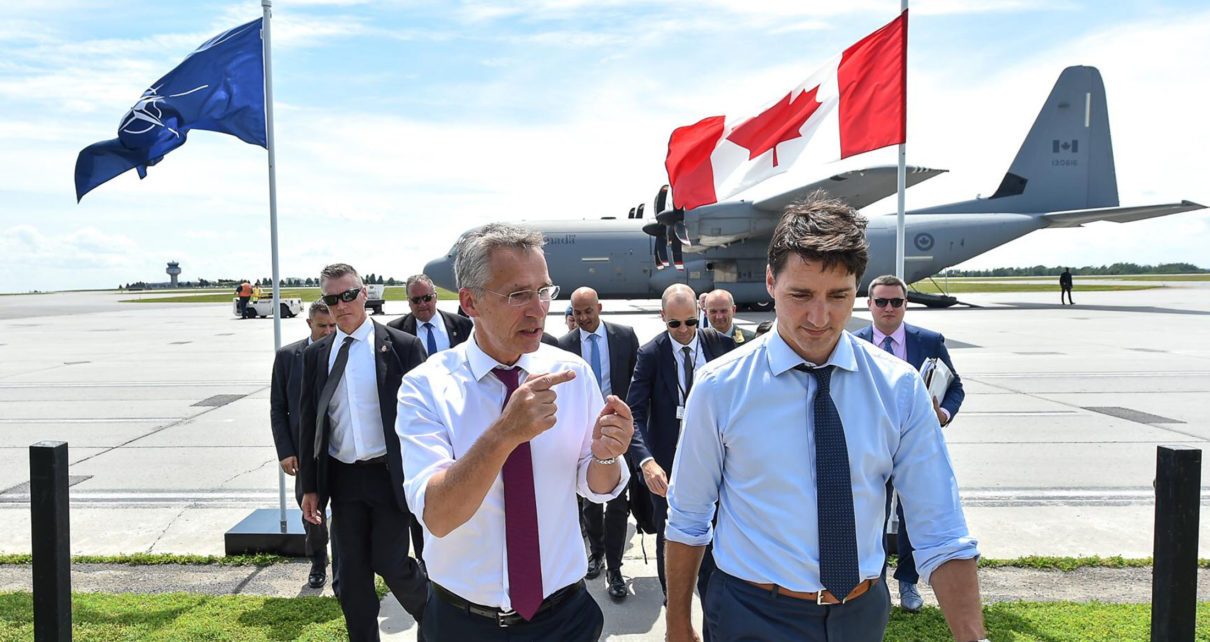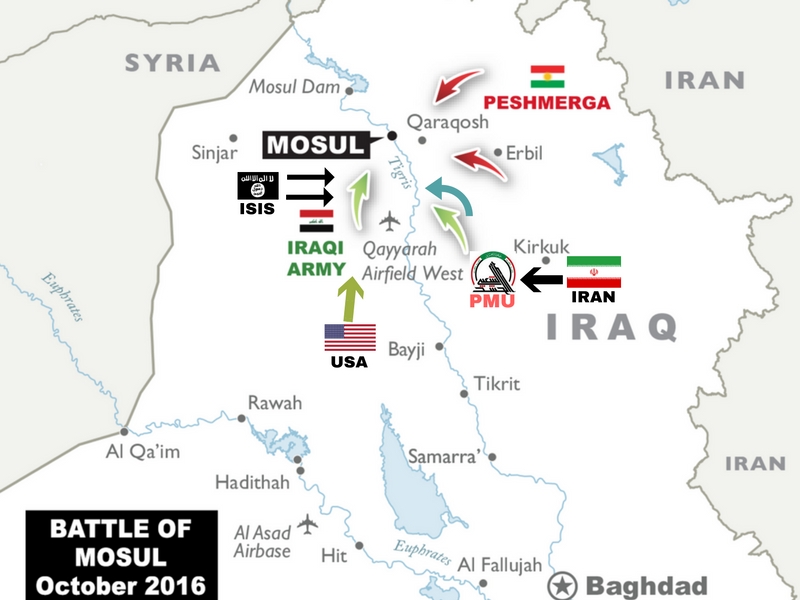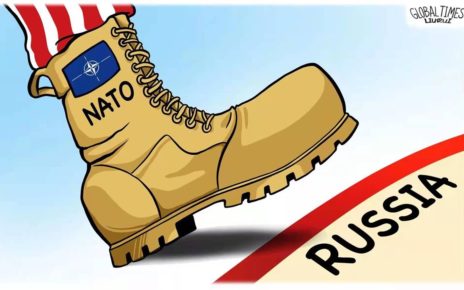I had the privilege to interview Professor Aaron Ettinger of Carleton University about Canada’s role in NATO and how Canadian foreign policy shapes the nation’s commitment with the organization. Overall, I asked, is Canada really making a difference?
Professor Ettinger specializes in International Relations and US foreign policy. His research focuses on continuity and change in US foreign policy in the post-Cold War era and its implications for world order. In 2021, he was awarded the Canadian Political Science Association Prize for Teaching Excellence. Before joining the Department of Political Science at Carleton, he taught at the University of Waterloo, Dalhousie University, and Queen’s University. To find more information on his work and publications, visit https://carleton.ca/polisci/people/aaron-ettinger/.
Note from the interviewer: The conversation was conducted initially through Zoom and then additional comments were added through email correspondence. In addition, the conversation was lightly edited.
Hello Professor Ettinger, thank you for taking the time for this interview about Canada’s role in NATO. To get started, can you tell me what is Canada’s role in NATO? Essentially, fill in the blank.
Preservationist.
Canada has a real interest in preserving the status quo. For 73 years, Canada has worked hard to make NATO work as an organization. So much of Canada’s foreign policy relies on organizations like NATO. In fact, it’s hard to imagine a Canadian foreign policy that does not include these organizations of the liberal international order. Working without these organizations has been the precedent since the end of the Second World War and nobody really wants to imagine a Canadian foreign policy without them. So that’s why my word is preservationist.
That is a very powerful word. Thank you for describing that! Could you explain what are Canada’s three key issues with NATO? What is our focus?
Spending: NATO has set a target for military spending at 2 per cent of GDP. We’ve heard a lot about that over the past five years. Right now, Canada spends at about 1.4 per cent of GDP and is in the lower one-third of spenders when you measure spending by proportion of GDP. This is important because Canada wants to make credible commitments to NATO, especially when Russia is waging war in Europe once again. Chronic underspending on the military over the past three decades has left Canada with huge capabilities deficit and the reasons for those deficits have everything to do with domestic politics within Canada.
The procurement process for big ticket items like navy ships and aircraft is a mess, and highly politicized. Shipbuilding isn’t just about building ships, it’s also about regional economic development. Which shipyard in what city should get the big contract? Right there we have defence questions wrapped up in political and electoral concerns. With aircraft, the story is much the same. Remember the controversies about F-35 procurement. The public debate about which fighter jet to buy had nothing to do with the merits of the equipment and everything to do with short-term political battles in Ottawa. The result has been a series of stopgap measures to replace Canada’s fifty-year old fighter jets with an interim fleet. This is hardly satisfactory.
These are just two examples. Canada has underfunded its military for a long time and the result is a long-term decline in capabilities. There was a period of new spending in the mid-2000s, but that was a temporary response to the war in Afghanistan. Right now, pouring new money into the military would not solve the problem. The system cannot absorb new funding all at once. It will take years and steady commitment to rebuild.
Democratic backsliding: we’re seeing a decline in the quality of some democracies in Europe. Hungary and Turkey are the chief examples, but we can also point to Poland. NATO is supposed
to be an alliance of democracies that is committed to the rules-based liberal order of things. However, democratic backsliding means that Canada is obligated to the mutual defence of illiberal, non-democracies. That’s not an idea that sits well.
Priorities: NATO and Canada have to decide what NATO is for. In the 1990s, NATO decided to expand the scope of its operations – go “out of area or go out of business” was the phrase. So NATO got involved in peacekeeping and peace-making operations in the Balkans, then counterterrorism and nation-building in Afghanistan.
The record of those operations is mixed; and, with the war in Ukraine, NATO has to figure out what it wants to be. Is it an organization set up for the defence of the European homeland? Is it for humanitarian interventions in “out of area operations”? Is it to police migrants coming from North Africa and the Middle East? An organization that tries to do everything will succeed in doing nothing especially well.
How strong is Canada’s foreign policy? Could you describe Canada’s foreign policy framework and how it fits into NATO?
The basic question is “what’s the purpose of NATO?” Its original purpose was to guarantee the freedom and security of its members through political and military means. Since the end of the Cold War, the meaning of that has expanded enormously. In the 2020s, NATO remains a regional multilateral organization with core interests in Europe. It requires a strong diplomatic and political stance, but that’s not possible without figuring out the answer to the bigger question.
The fundamentals remain the same: Canada is committed to formal multilateralism in world politics with NATO at the centre. How strong is Canada’s foreign policy? That’s a matter of Canada’s ability to back up its rhetorical multilateralism with actual contributions.
I think there’s something more fundamental at play. Canada is pulled between two competing priorities: the first is that traditional commitment to NATO and Europe. The second is Canada’s commitment to North America and the United States. Which one is most important to Canada’s national interests? Is Canada’s foreign policy going to be continentalist or internationalist? The two are not necessarily mutually exclusive; but where there are limited resources, Canada’s policy makers have to decide where to focus attention. In my mind, the defence of the continent should be prioritized.
Canada needs a foreign and defence policy that is plausible and given the country’s capabilities. For a very long time, Canada has promoted itself as a global influencer. But Canada can’t be all things to all people. This means prioritizing. I would think that defence of the North American homeland is the most significant. From there, you can imagine concentric circles of importance emanating from that core interest. Thinking this way means deprioritizing commitments to places further afield and matching interests with capabilities.
Many people are learning more about NATO and about its political and military objectives, which is great! But why should Canadians learn about NATO? Why does it make a difference to my friends or me in the GTA?
Yes. NATO seems far removed from day-to-day life in Toronto and those summits can seem terribly elitist. Canadians should learn about NATO because it’s an important part of what keeps the international system stable. It’s also important to Canada’s foreign policy. It’s part of what this country does on the world stage and is a reflection of its values.
Should NATO resources be used to help migrants crossing the Mediterranean Sea? That’s of interest to diasporic communities in Toronto.
Should NATO and Canada step in to stop a genocide? Should NATO and Canada fight Russia in Ukraine? Should NATO be disbanded altogether and should Canada renounce military power?
These are questions of values – who we are and what we’ll do and what we won’t do – and they are not easy to answer.
Definitely not easy questions to answer. Thank you again for your time and expert perspective!
Thank you! It was great talking to you!
Disclaimer: Any views or opinions expressed in articles are solely those of the authors and do not necessarily represent the views of the NATO Association of Canada.
Photo: ”NATO Secretary General Jens Stoltenberg and the Prime Minister of Canada Justin Trudeau” (2019), by NATO via Flickr. Licensed CC BY-NC-ND 2.0.




